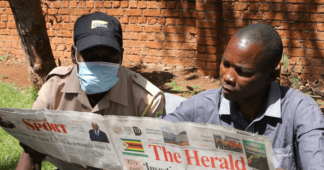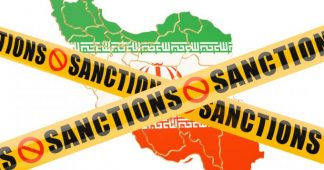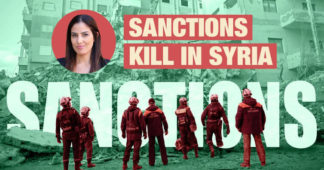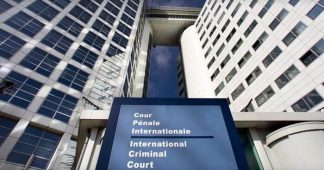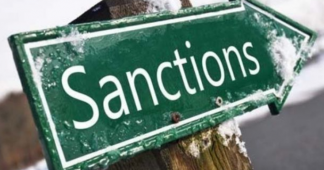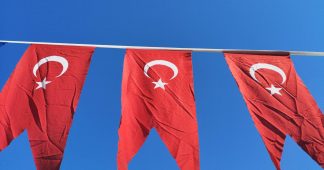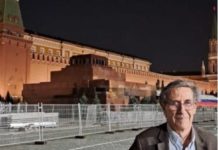By Jeremy Kuzmarov
The U.S. is blaming Zimbabwe’s government (which it is conveniently trying to overthrow) for the tragic humanitarian crises afflicting its suffering people. But the International People’s Tribunal on U.S. Imperialism has now placed responsibility directly on the harsh economic sanctions that the U.S. has been imposing on Zimbabwe for the last 22 years.
Just two years after the U.S. had imposed sanctions in 2001, Zimbabwe’s economy contracted 23% and inflation skyrocketed by more than 560%.
On February 4, expert witnesses testified at an International People’s Tribunal on U.S. Imperialism about the adverse impact of sanctions on Zimbabwe.
Organized by an assortment of peace and social justice organizations, the hearings were the first in a series that aims to spotlight the pernicious impact of U.S. sanctions on 16 countries in Latin America, Africa and Asia, arguing that such sanctions function as a “key tool of U.S. imperialism.”
The first speaker, Rutendo Benson Matinyarare, chairman of the Zimbabweans Against Sanctions movement, noted that, between 2001 and 2008, Zimbabwe’s economy contracted by 17% as a result of the sanctions, then contracted even more, to 23%. Inflation skyrocketed by more than 560% in just two years after the sanctions were imposed—and some 280 million percent by 2008.
On the eve of the Africa leaders summit in Washington, D.C., in December, the Biden administration slapped yet another round of sanctions on Zimbabwe that will further worsen living conditions for Zimbabwe’s population.
One of the targets was Emmerson Mnangagwa, Jr., the son of the previously sanctioned President Emmerson Mnangagwa (2017-present), along with three other people and two companies that were accused of “undermining democracy and facilitating high level graft.”
The sanctions were designed to freeze any assets the targets may have had within U.S. jurisdiction and bar Americans from doing business with them. (Mnangagwa Jr. is in charge of his father’s business interests related to a prominent businessman, Kudakwashe Tagwirei, and his Sakunda Holdings company, both of which are already subjects of U.S. sanctions).
The U.S. Treasury Department announced in December 2022: “We urge the Zimbabwean government to take meaningful steps towards creating a peaceful, prosperous, and politically vibrant Zimbabwe, and to address the root causes of many of Zimbabwe’s ills: corrupt elites and their abuse of the country’s institutions for their personal benefit. The goal of sanctions is behavior change. Today’s actions demonstrate our support for a transparent and prosperous Zimbabwe.”
The reference to “behavior change” seems very close to “regime change,” which is clearly an underlying goal of the U.S. sanctions.
By weakening Zimbabwe’s economy and creating hardship among its people, the aim is for Zimbabweans to turn against their government, which has resisted efforts to keep its economy subordinate to Western interests as a supplier of raw materials, source of cheap labor and consumer of manufactured goods produced elsewhere.
“A Program to Maintain White-Skin Privilege”
U.S. sanctions on Zimbabwe were first applied by the Bush administration in December 2001 after the U.S. Congress passed the Zimbabwe Democracy and Economic Recovery Act (ZDERA), which restricted Zimbabwe’s access to credit and loans provided by international lending institutions including the International Monetary Fund (IMF) and World Bank.
ZDERA was introduced in the Senate by Russ Feingold (D-WI) and Bill First (R-TN) and sponsored by Hillary Clinton (D-NY), Joe Biden (D-DE), and Jesse Helms (R-NC). 97% of the House of Representatives voted for it.
Cynthia McKinney (D-GA) referred to ZDERA as “nothing more than a formal declaration of United States complicity in a program to maintain white-skin privilege;” “under the hypocritical guise of providing a ‘transition to democracy.’”
The passage of ZDERA followed Zimbabwean President Robert Mugabe’s initiation of a historic land redistribution program, which returned land that had been taken over by Europeans when Zimbabwe (then Southern Rhodesia) was colonized by white settlers at the turn of the 20th century.
A bibliophile who studied at Fort Hare, the only Black South African university, where he was exposed to revolutionary Marxist and pan-Africanist ideals, Mugabe had been imprisoned by the white supremacist Ian Smith regime from 1964 to 1974. He became Zimbabwe’s first president in 1980 as head of the Zimbabwe African National Union—Patriotic Front (ZANU-PF), ruling until his death in 2019 when he was succeeded by Mnangagwa.[1]
Vilified in Western media, Mugabe displayed tyrannical qualities but cultivated a strong base of support in Zimbabwe’s rural areas and among traditional tribal chiefs.[2] He was disliked in the West primarily because his government a) embraced pan-Africanist and socialist principles; b) aimed to advance Zimbabwe’s industrialization; c) supported the anti-apartheid struggle; and d) supported the historic land reform initiatives that aimed to overturn Zimbabwe’s colonial legacy.[3]
In 2003, Mugabe adopted a “Look East” policy, declaring: “We have turned East, where the sun rises, and given our backs to the West, where the sun sets.”[4] Mnangagwa—who received military training in China in the 1960s—has further deepened Zimbabwe’s relations with China.
For the last 20 years, the U.S. government has covertly supported the Movement for Democratic Change (MDC), an opposition party launched in 1999 that has received generous funding from the National Endowment for Democracy (NED)—a CIA offshoot that supports propaganda and pro-U.S. political parties.
ZDERA was first passed, conveniently, right after MDC had lost parliamentary elections. Its major aim was to boost MDC’s political fortunes when Mugabe’s ZANU-PF Party had just instituted his land reform initiative.
The MDC’s leader until his death in 2018, Morgan Tsvangirai, adopted a neo-liberal economic program that strove to open Zimbabwe to foreign exploitation and was accused of trying to assassinate Mugabe.
In 2011, when Mugabe pushed for the nationalization of foreign-owned companies and reaffirmed a bill forcing foreign-owned companies worth more than $500,000 to have at least 51% Black ownership, Tsvangirai denounced the plan “as looting and plunder by a greedy elite.”
Sanctions of Mass Destruction
In his talk at the People’s Tribunal, Rutendo Benson Matinyarare provided a shocking set of statistics that underscored the horrifying effects of U.S. as well as EU sanctions on Zimbabwe.
Between 2000 and 2014, according to Rutendo, Zimbabwe lost more than $42 billion in revenue and its GDP fell 35%.
Access to health care in that time declined considerably, and thousands of Zimbabweans lost their jobs as the government could no longer afford to subsidize state-run industries like ZISCO steel, which laid off 5,000 workers, and SABLE Chemicals, which manufactured chemicals to purify water. Access to clean water in Zimbabwe’s cities, consequently, plummeted from 29% to 22% in cities and from 50% to below 50% in rural areas—as the country was gripped by cholera and typhoid epidemics.
Many people also died in road accidents because the government could no longer fund first responders, while Zimbabwe’s rail infrastructure became dilapidated as it had been dependent on General Electric (GE) for the furnishing of locomotives.
Infant mortality rates and the number of women dying during childbirth at the same time skyrocketed, and Zimbabwe suffered from a major brain drain, with millions of people displaced artificially.
The U.S. and European media, political elite and intellectual classes blamed Zimbabwean government mismanagement under Mugabe and corruption for the catastrophe that befell the country in the early 21st century.
However, under Mugabe’s leadership in the late 1990s, Zimbabwe had had one of the best health care and education systems in Africa, the second biggest stock exchange, and was a key breadbasket for the entire SADC [South African Development Community] region.
The drastic change could only be accounted for by the sanctions, which deprived the Zimbabwean government of needed credit and loans and destroyed its tax base as the economy contracted.
Illegality and Wall Street Windfall
While ordinary Zimbabweans suffer, Rutendo pointed out that powerful Wall Street investment firms such as BlackRock, Vanguard, State Street and Fidelity continue to invest in Zimbabwe’s stock exchange. Somehow they are immune from the sanctions.
The illegality of the sanctions appears to have been recognized even by the U.S. government.
When Zimbabwe’s CBZ Bank refused to pay a $385 million fine for violating sanctions and sued the U.S. government, the U.S. government quietly backed off and a secret settlement was reached that was likely very favorable toward CBZ.
A Warning to Zimbabwe’s SADC Neighbors
Milton Allimadi, the other main expert witness at the tribunal, who is the publisher of Black Star News, emphasized that a main goal of the Zimbabwean sanctions is to send a signal to South Africa and Namibia that they should not redistribute their land—or they will face similar consequences as Zimbabwe.
Allimadi said that Europeans in South Africa constitute 8% of the population but control 72% of the land, despite the end of Apartheid. In Namibia—where President Sam Nujoma (1990-2005) supported Mugabe’s land reform—Europeans constitute 6% of the population but also control 70% of the land.
Allimadi noted that the media began vilifying Mugabe in the West once he instituted his land reform and was moving forward with industrialization plans.
The scurrilous stories lent support not only to the U.S. sanctions but also to a U.S. plot to back a South African invasion of Zimbabwe.
When Allimadi traveled to Zimbabwe in the early 2000s, he saw directly how the media lied: He had read about white Europeans being attacked in the streets of Harare and other Zimbabwean cities but witnessed nothing like that on his trip.
Colonial Legacy
According to Rutendo, Zimbabwe is still bearing the burden of sanctions imposed on it by the UN in 1966 (and supported by the U.S. and UK) when it refused to follow Northern Rhodesia (Zambia) on its path to independence, and instead formed a renegade regime of white settlers under Ian Smith.
Rutendo specified that the intention of the sanctions at that time was to punish Blacks down the road—to cripple and deindustrialize its economy—when they would gain independence, and that Ian Smith was able to enrich himself and extend his regime by obtaining illegal loans that were in violation of the sanctions.
When Zimbabwe became independent under Mugabe’s leadership, the country was forced to assume the debts of Smith’s government, which had failed to provide basic health care, education, housing or energy for the majority Black population.
The U.S. and UK at this time partnered with South Africa’s Apartheid government to destabilize Zimbabwe, which played a key role in the anti-Apartheid struggle as a base of operation for African National Congress (ANC) anti-Apartheid activists.[5]
South Africa’s Apartheid state worked to sabotage Zimbabwe’s infrastructure and promoted terrorist acts, primarily in neighboring Mozambique, affecting the entire regional economy, and plunging the new Zimbabwean state into greater debt.
The CIA supported right-wing Mozambican National Resistance (RENAMO) terrorists who were allied with Apartheid South Africa and a vital aspect of regional
Crime Against Humanity and Instrument of Regime Change
Rutendo suggests that the U.S. sanctions policy is a crime against humanity that discriminates against Zimbabweans, a form of collective punishment for Zimbabwe’s political defiance of the U.S.-dominated world order, and political instrument to affect regime change.
The U.S. government claims that it wants to advance democracy in Zimbabwe, though it rigs elections through the sanctions and supports a political party, MDC, that Rutendo considers to be a terrorist organization because it uses coercion and supports the persecution of Zimbabweans and killing of them through hunger in an attempt to gain political power.
Rutendo said that Americans would not tolerate a political party that was there for the explicit purpose of destabilizing the United States—which is true of the MDC.
Rutendo also noted the U.S. hypocrisy of crying wolf about Russian interference in its past elections, when he says the U.S. has been manipulating elections in Zimbabwe for 22 years through its support for the sanctions and MDC.
- On Mugabe’s background, see Sue Onslow and Martin Plaut, Robert Mugabe (Athens: Ohio University Press, 2018). This book provides good information and acknowledges the need for land reform and that Mugabe has a strong base of support in Zimbabwe, but is typical of Western scholarship in its anti-Mugabe bias and denial of the endurance of Western imperialism in the 1980s, 1990s and 2000s and attempts to affect regime change. The authors blame Mugabe for Zimbabwe’s problems while failing, in a glaring omission, to even discuss the U.S. and EU sanctions. A similar bias is evident in William J. Mpofu’s book, Robert Mugabe and the Will to Power in an African Postcolony (New York: Palgrave McMillan, 2021), which supports Samantha Power’s characterization of Mugabe’s rule as “the art of how to kill a country.” Mpofu further claims that “Mugabe participated in the defeat of white settler colonialism in order to replace it with his own nativist colonization of Zimbabwe.” A search through the index reveals that the term sanctions or ZDERA appears nowhere in the scholarly text. ↑
- Onslow and Plaut, Robert Mugabe, 128. Mugabe also had the support of Zimbabwe’s dominant Shona tribe and delivered many of his speeches in Shona. A low point of Mugabe’s rule was the Gukurahundi in the early 1980s when North Korean-trained army regiments in western Zimbabwe massacred supporters of the Zimbabwe African People’s Union (ZAPU), a rival of ZANU-PF, which had its base among the Ndebele and Katanga people. Mugabe himself described the early 1980s as a “moment of madness.” Stuart Doran, “New Documents Claim to Prove Mugabe Ordered Gukurahundi Killings,” The Guardian, May 19, 2015, https://www.theguardian.com/world/2015/may/19/mugabe-zimbabwe-gukurahundi-massacre-matabelelan ↑
- Onslow and Plaut, Robert Mugabe. Mugabe was a leader of the Non-Aligned Movement in the 1980s. Another reason Western powers hated him was because, in the 1990s, he sent Zimbabwean troops into the Democratic Republic of Congo (DRC) at the invitation of the DRC government to protect it from outside imperialist invasion led by U.S. proxies Rwanda and Uganda, which were intent on plundering the DRC’s mineral wealth and opening it to exploitation by U.S. corporations. ↑
- Onslow and Plaut, Robert Mugabe, 115. ↑
- Zambia, ruled at the time by socialist Kenneth Kaunda (1964-1991), was another important base of operation for the ANC. The CIA in 1981 backed a coup against Kaunda. ↑
We remind our readers that publication of articles on our site does not mean that we agree with what is written. Our policy is to publish anything which we consider of interest, so as to assist our readers in forming their opinions. Sometimes we even publish articles with which we totally disagree, since we believe it is important for our readers to be informed on as wide a spectrum of views as possible.
